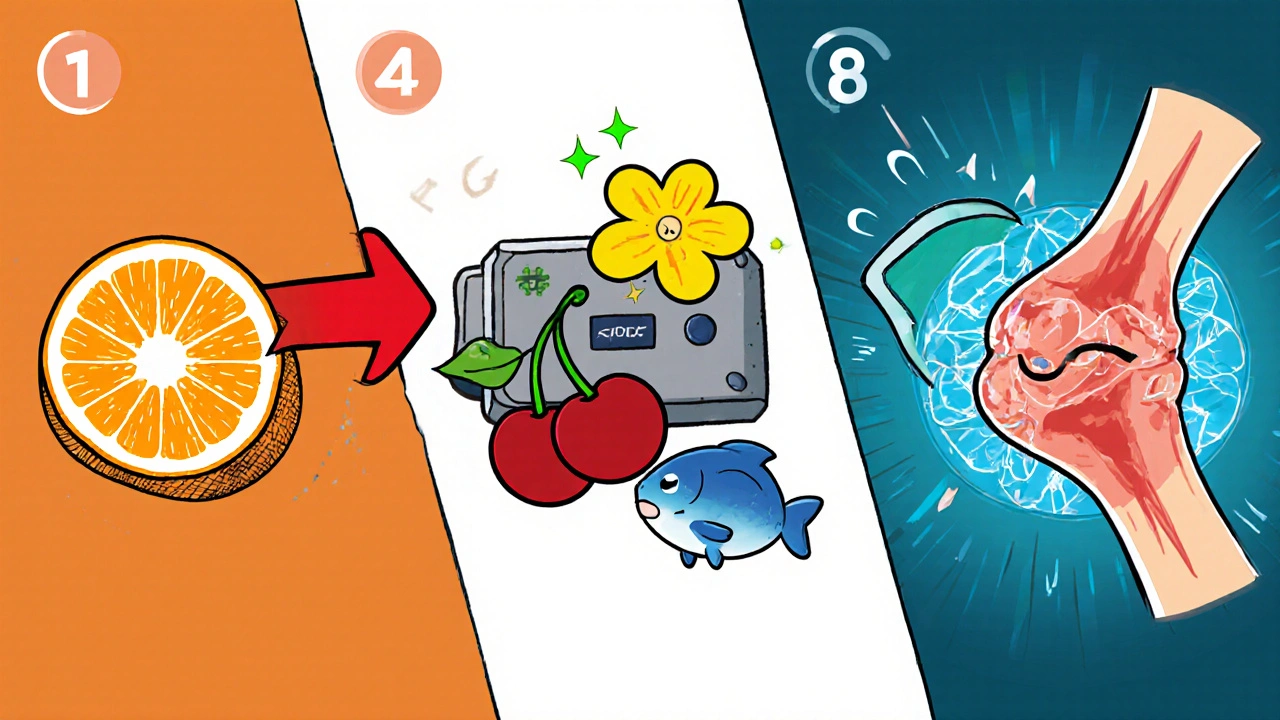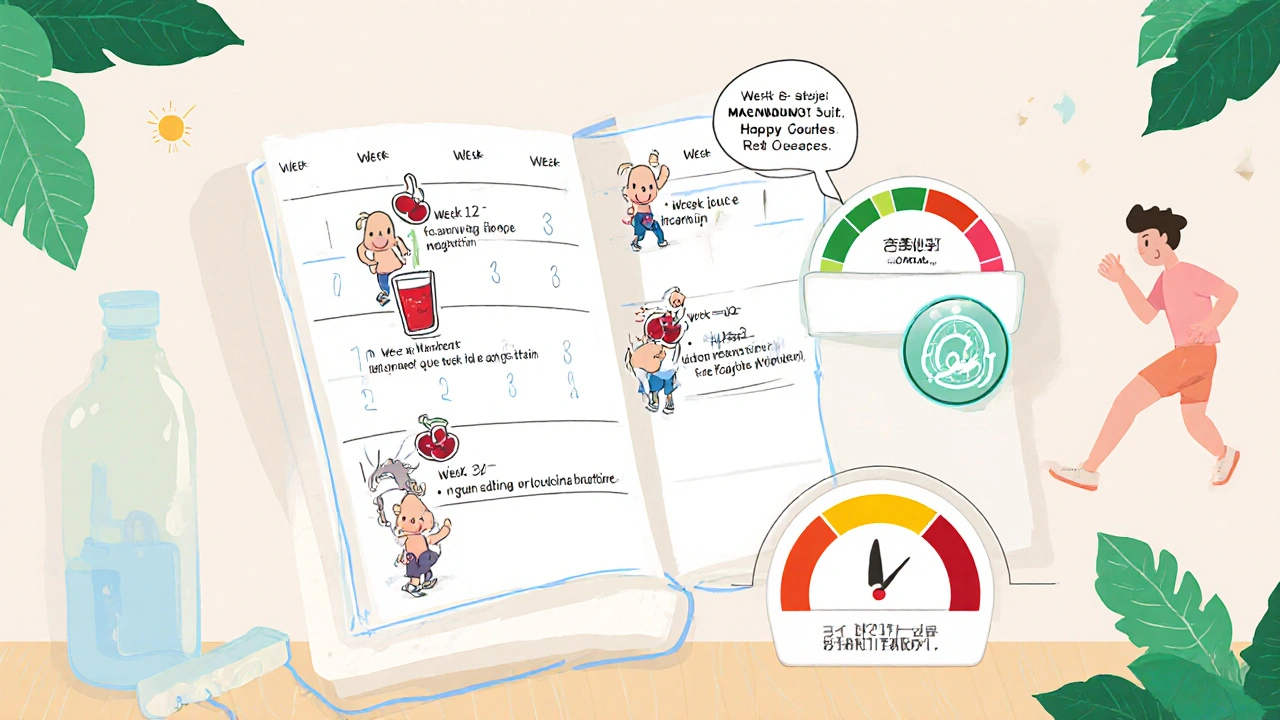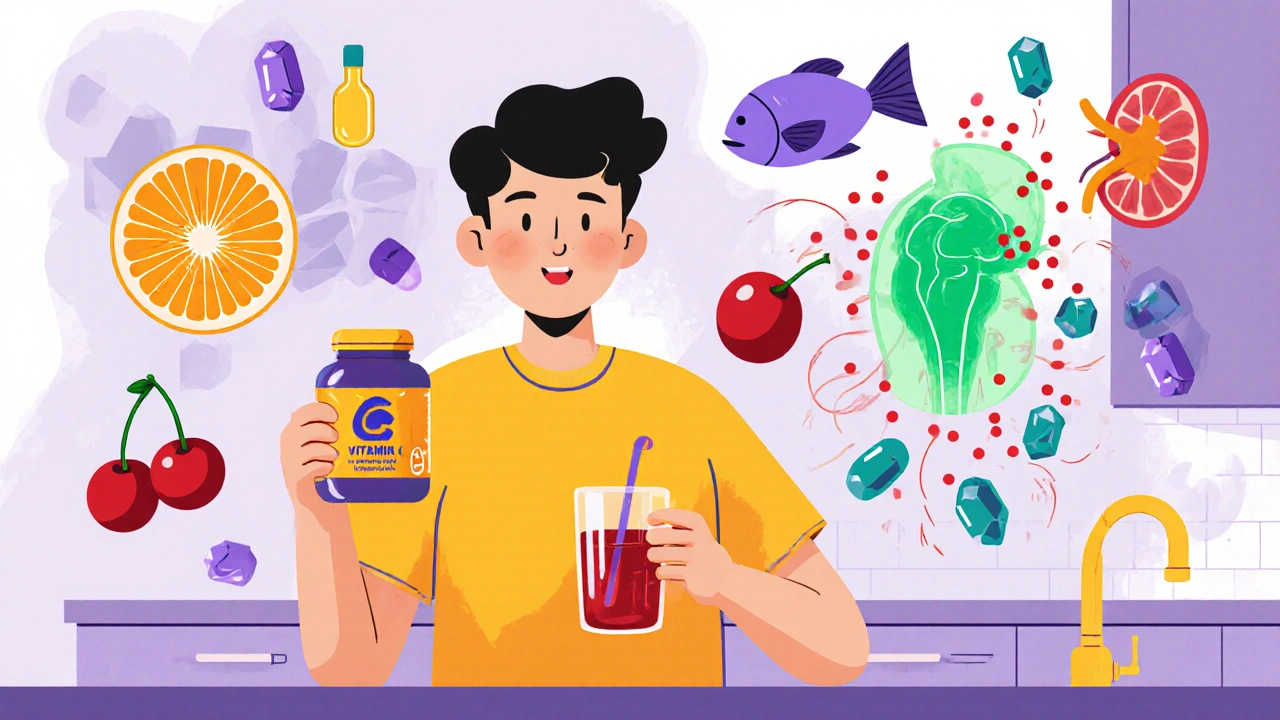Uric Acid Supplement Comparison Tool
Compare the top supplements for managing high uric acid levels based on clinical evidence, typical doses, key benefits, and potential side effects. Use this tool to make informed decisions about which supplements might work best for your situation.
Vitamin C
Typical Dose: 500-1000 mg daily
Moderate EvidenceBoosts renal excretion of uric acid. A 2015 double-blind study showed a 12% drop in serum uric acid after eight weeks of 500 mg daily.
- Stomach upset
- Kidney stones at very high doses
Key Tip: Do not exceed 2000 mg daily to avoid increasing kidney stone risk from oxalate buildup.
Cherry Extract
Typical Dose: 30-60 ml concentrate or 1 g powder
Strong EvidenceAntioxidant, reduces gout flare frequency. The 2023 meta-analysis reported a 0.6 mg/dL average reduction in uric acid levels.
- Minor GI upset
- Possible sugar load
Key Tip: Choose low-sugar concentrates if watching your sugar intake.
Quercetin
Typical Dose: 500 mg twice daily
Low-to-Moderate EvidenceInhibits xanthine oxidase (same enzyme targeted by allopurinol), anti-inflammatory. Small trials indicate a 0.3 mg/dL drop with fewer gout flares.
- Headache
- Tingling at high doses
Key Tip: Avoid if taking allopurinol without medical supervision.
Omega-3 Fatty Acids
Typical Dose: 1-2 g EPA/DHA
Moderate EvidenceReduces inflammatory markers (IL-1β, TNF-α) that aggravate gout attacks. Improves joint comfort without dramatically shifting uric acid numbers.
- Fishy aftertaste
- Mild GI upset
Key Tip: Take with food to minimize fishy aftertaste and GI issues.
Magnesium
Typical Dose: 300-400 mg elemental
Low EvidenceImproves renal handling of urate by enhancing urate transporter activity in kidney tubules. Especially beneficial when diet is low in magnesium.
- Diarrhea if excess
Key Tip: Magnesium glycinate is best tolerated and recommended for most users.
Important Considerations
Consult Your Doctor: Before starting any supplement regimen, especially if you have kidney disease or take medications like allopurinol.
Don't Replace Prescriptions: Supplements are adjuncts, not cures. They should complement, not replace, prescription medications.
Combine with Lifestyle: For best results, pair supplements with hydration, low-purine foods, and regular movement.
Track Your Progress: Monitor uric acid levels and symptoms to see what works best for you.
Quick Takeaways
- Vitamin C, cherry extract, quercetin, omega‑3s and magnesium have the strongest evidence for lowering uric acid.
- Effective doses are usually low‑to‑moderate; more isn’t always better.
- Combine supplements with hydration, low‑purine foods and regular movement for best results.
- Watch for interactions with prescription drugs like allopurinol.
- Consult a healthcare professional if you have kidney disease or recurrent gout attacks.
When dealing with Uric Acid that consistently runs high, the idea of popping a pill or powder can feel like a shortcut. But not all pills are created equal. The right supplements for high uric acid can gently nudge the body toward better balance, while the wrong ones might clash with meds or cause stomach upset. Below we break down the science, list the top contenders, and give a practical roadmap for anyone trying to keep those levels in check.
Understanding Uric Acid and Hyperuricemia
Uric Acid is a by‑product of purine metabolism - purines are natural chemicals found in many foods and also in our own cells. Normally, the kidneys filter excess uric acid into urine. When the kidneys can’t keep up, or when the body produces too much, blood levels rise, a condition called hyperuricemia.
High uric acid doesn’t always cause symptoms, but prolonged elevation can lead to gout crystals forming in joints, kidney stones, or even chronic kidney disease. Lifestyle tweaks (weight control, limiting red meat and booze) are first‑line, yet many people look for an extra edge - that’s where Dietary supplement comes in.
How Supplements Influence Uric Acid Levels
Supplements work through three broad mechanisms:
- Increasing renal excretion: Some compounds boost the kidneys’ ability to dump uric acid.
- Reducing production: Others lower the enzymatic steps that create uric acid.
- Anti‑inflammatory protection: Even if levels stay the same, certain antioxidants calm the joint inflammation that gout brings.
Not every supplement hits all three points, and the evidence varies. Below we focus on those with solid human trials.

Top Supplements Backed by Research
| Supplement | Typical Dose | Evidence Strength | Key Benefit | Common Side Effects |
|---|---|---|---|---|
| Vitamin C | 500-1000 mg daily | Moderate (randomized trials) | Boosts renal excretion | Stomach upset, kidney stones at very high doses |
| Cherry extract | 30-60 ml concentrate or 1 g powder | Strong (meta‑analysis of 7 trials) | Antioxidant, reduces gout flare frequency | Minor GI upset, possible sugar load |
| Quercetin | 500 mg twice daily | Low‑to‑moderate (small pilot studies) | Inhibits xanthine oxidase, anti‑inflammatory | Headache, tingling at high doses |
| Omega‑3 fatty acids | 1-2 g EPA/DHA | Moderate (observational + RCTs) | Reduces inflammatory markers | Fishy aftertaste, mild GI upset |
| Magnesium | 300-400 mg elemental | Low (few targeted studies) | Improves renal handling of urate | Diarrhea if excess |
Here’s why these five keep showing up:
- Vitamin C works as a mild uricosuric, meaning it helps the kidneys flush out uric acid. A 2015 double‑blind study showed a 12% drop in serum uric acid after eight weeks of 500 mg daily.
- Cherry extract (especially tart cherry) is rich in anthocyanins, which block inflammatory pathways and may reduce uric acid production. The most recent 2023 meta‑analysis reported a 0.6 mg/dL average reduction.
- Quercetin is a flavonoid that directly inhibits xanthine oxidase - the same enzyme that allopurinol targets. Small trials indicate a 0.3 mg/dL drop, with the added perk of fewer gout flares.
- Omega‑3 fatty acids lower IL‑1β and TNF‑α, cytokines that aggravate gout attacks. While they don’t dramatically shift uric acid numbers, they improve joint comfort.
- Magnesium can enhance the activity of urate transporters in the kidney tubules, encouraging excretion. Supplementing helps especially when diet is low in magnesium.
How to Choose & Use Supplements Safely
Follow these steps before adding a new capsule to your regimen:
- Check your baseline. Get a fasting serum uric acid test; aim for < 6 mg/dL (women) or < 7 mg/dL (men).
- Review medications. If you’re on Allopurinol or febuxostat, high‑dose vitamin C can increase kidney stone risk. Talk to your doctor.
- Start low, go slow. Begin with half the suggested dose, monitor tolerance for two weeks, then increase if needed.
- Track symptoms. Keep a simple log of uric acid readings, joint pain, and any side effects.
- Never replace prescription meds. Supplements are adjuncts, not cures.
Most people find that a combination - say, 500 mg vitamin C plus a daily cherry concentrate - works better than any single agent.

Lifestyle Tips that Boost Supplement Effectiveness
Supplements shine when paired with basic habits:
- Hydrate. Aim for 2-3 L of water daily; dilute uric acid concentration.
- Limit high‑purine foods. Red meat, organ meats, anchovies, and beer are big contributors.
- Maintain a healthy weight. Each kilogram lost can lower uric acid by about 0.1 mg/dL.
- Move regularly. Light aerobic activity improves kidney blood flow.
When you line these habits up, the same 500 mg of vitamin C may achieve a 15% greater reduction than on a sedentary, high‑purine diet.
Common Pitfalls & When to See a Doctor
Even the best‑studied supplements can backfire if misused:
- Over‑dosing. More than 2000 mg of vitamin C per day can actually increase oxalate, raising kidney stone risk.
- Ignoring kidney function. If eGFR is below 60 mL/min/1.73 m², some uricosuric agents (including high‑dose vitamin C) should be avoided.
- Missing drug interactions. Certain diuretics raise uric acid; adding a supplement that also raises urinary calcium may compound the issue.
If you notice persistent joint pain, swelling, or urine that appears cloudy, book an appointment. Laboratory tests can reveal whether supplements are helping or hurting.
Putting It All Together - A Sample 12‑Week Plan
- Week 1-2: Start vitamin C 500 mg daily + 500 ml tart cherry juice three times a week.
- Week 3-4: Add 500 mg quercetin twice daily if no stomach upset.
- Week 5-8: Introduce omega‑3 fish oil 1 g EPA/DHA daily.
- Week 9-12: Add magnesium glycinate 300 mg nightly.
- Every 4 weeks: Re‑test uric acid, adjust doses, and note any flare‑ups.
This staggered approach lets you see which ingredient moves the needle for you personally, while keeping side‑effects manageable.
Can I rely only on supplements to treat gout?
Supplements can lower uric acid and reduce flare frequency, but they don’t replace prescription meds for severe gout. Use them as part of a broader plan that includes diet, hydration, and doctor‑prescribed therapy when needed.
Is vitamin C safe for anyone with high uric acid?
Generally safe at 500-1000 mg daily, but people with a history of kidney stones or severe kidney disease should avoid high doses and talk to a clinician first.
How much cherry juice should I drink?
Studies use 30 ml of concentrate or about 1 cup (240 ml) of unsweetened tart cherry juice three times a day. If you’re watching sugar, choose a low‑sugar concentrate or a powdered extract.
Will magnesium interfere with my blood pressure meds?
Magnesium can lower blood pressure slightly, which is usually beneficial. However, if you’re on high‑dose calcium channel blockers, check with your doctor to avoid additive effects.
Are omega‑3 supplements necessary if I eat fish?
Two servings of fatty fish per week provide enough EPA/DHA for most people. If you’re vegetarian or don’t eat fish regularly, a supplement fills the gap and still offers anti‑inflammatory benefits.

Reading about uric acid really made me think about the delicate balance we all strive for in life. It’s amazing how a simple vitamin can tip the scales in our favor. The body’s chemistry is a restless river and supplements are like small stones that guide its flow. Yet we must remember that the river knows its own path and we should not dam it completely. Staying hydrated and moving a bit each day feels like the sun that keeps the water moving. So the supplement plan should sit beside those habits like a quiet partner, not a spotlight.